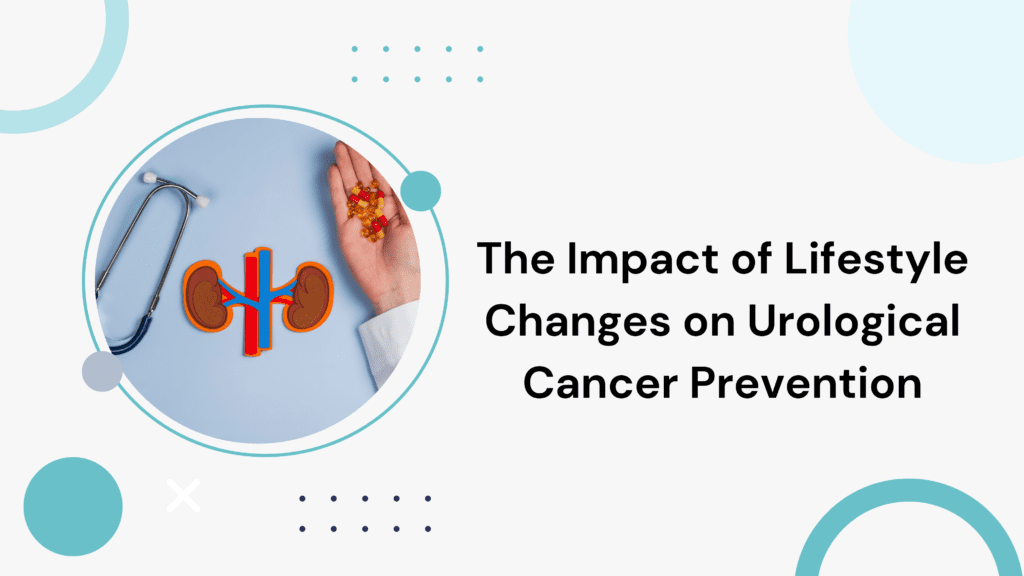The Impact of Lifestyle Changes on Urological Cancer Prevention
- dr anil kumar t
- July 17, 2024
- 12:57 pm

Urological cancers, including prostate, bladder, kidney, and testicular cancers, are significant health concerns worldwide. While genetics and environmental factors play a role in their development, lifestyle choices are increasingly recognized as critical in preventing these cancers. Adopting healthier habits can substantially reduce the risk of developing urological cancers and improve overall well-being. This blog explores how lifestyle changes can help in the prevention of these cancers.
1. Diet and Nutrition
A balanced diet rich in fruits, vegetables, whole grains, and lean proteins can have a profound impact on cancer prevention. Here’s how specific dietary choices can influence urological cancer risk:
- Fruits and Vegetables: These are high in antioxidants, vitamins, and minerals that protect cells from damage. For example, tomatoes contain lycopene, an antioxidant that has been linked to a reduced risk of prostate cancer.
- Healthy Fats: Incorporating healthy fats, such as those found in olive oil, avocados, and nuts, while reducing the intake of saturated and trans fats, can lower cancer risk.
- Red and Processed Meats: Limiting consumption of red and processed meats, which are associated with an increased risk of bladder and prostate cancers, is advisable. Opt for lean meats, fish, or plant-based protein sources instead.
2. Physical Activity
Regular physical activity is essential for maintaining a healthy weight and reducing the risk of various cancers, including those of the urinary system. Exercise helps regulate hormones, improve immune function, and reduce inflammation, all of which can contribute to cancer prevention.
- Moderate Exercise: Aim for at least 150 minutes of moderate exercise per week, such as brisk walking, cycling, or swimming.
- Strength Training: Incorporate strength training exercises at least two days a week to build muscle and maintain overall health.
3. Avoiding Tobacco and Limiting Alcohol
Tobacco use is a major risk factor for bladder and kidney cancers. Quitting smoking can significantly reduce the risk of developing these cancers and improve overall health. Additionally, excessive alcohol consumption is linked to an increased risk of various cancers, including those of the urinary system. Limiting alcohol intake to moderate levels (up to one drink per day for women and up to two drinks per day for men) is recommended.
4. Hydration
Staying well-hydrated by drinking plenty of water can help flush out toxins from the body and reduce the risk of bladder cancer. Adequate hydration dilutes urine and reduces the concentration of potential carcinogens in the urinary tract.
5. Maintaining a Healthy Weight
Obesity is a known risk factor for several types of urological cancers, including kidney and prostate cancers. Maintaining a healthy weight through a balanced diet and regular exercise can lower the risk of cancer and other chronic diseases.
6. Avoiding Exposure to Harmful Chemicals
Exposure to certain chemicals, such as those found in industrial environments, can increase the risk of bladder and kidney cancers. Taking precautions to avoid or minimize exposure to harmful chemicals at work and in daily life is essential. This includes using protective equipment and following safety guidelines.
7. Regular Screening and Check-ups
Regular medical check-ups and screenings can help detect urological cancers at an early stage when they are most treatable. Discussing personal risk factors with a healthcare provider and following recommended screening guidelines is crucial for early detection and prevention.
Conclusion
Preventing urological cancers involves a combination of healthy lifestyle choices, regular medical screenings, and awareness of risk factors. By adopting a nutritious diet, engaging in regular physical activity, avoiding tobacco and excessive alcohol, staying hydrated, maintaining a healthy weight, and minimizing exposure to harmful chemicals, individuals can significantly reduce their risk of developing these cancers. These lifestyle changes not only contribute to cancer prevention but also promote overall health and well-being, enhancing quality of life.
Book Your Consultation Now
Schedule an appointment with the leading uro-oncologist in Bangalore, Dr. Anil
Kumar T. Benefit from expert care and advanced treatment options for all your
urological needs, delivered with a patient-centered approach.

Visit Us
Zymus Hospital Address
No.1, K NO. 92, Nanjappa Complex, Kanakapura Rd, Raghuvanahalli, Bangalore City Municipal Corporation Layout, Bengaluru, Karnataka 560062
Menu
Quick Links
Copyright © 2024. Dr Anil Kumar T

